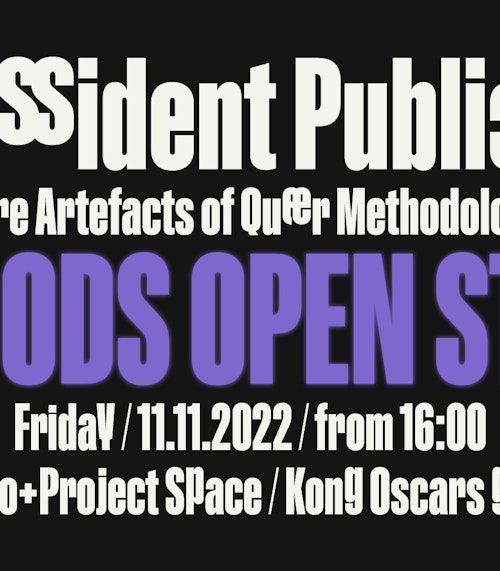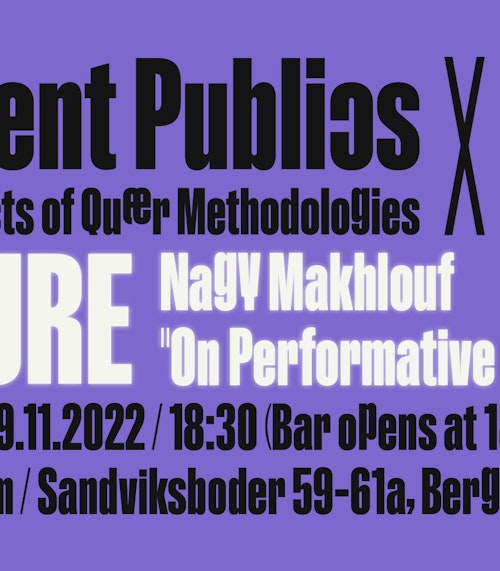ROM for kunst og arkitektur, Exutoire and NOGOODS look forward to welcoming you to a series of talks taking place both physically at ROM and online on Friday 26 August between 09:00 and 17:00. Free entrance, lunch not provided.
Dissident Publics: Seminar
Seminar
Fredag 26. august 2022
Kl. 09.00 - 17.00

Dissident Publics: Future Artefacts of Queer Methodologies (2022), Banner
Programme
09:00 – 09:15: Coffee & introduction
09:15 – 10:30: “For the Public Good?” with María Mazzanti (spatial practitioner, editor and researcher)
10:45 – 12:15: “Somatic Fictions and Transmaterial Realities” with Teo Ala-Ruona (performance artist and teacher)
12:15 – 13:15 : Lunch
13:15 – 14:45: “Mapping Multi-Scale Experiences in the Urban Fabric: A Visual Exercise on Disclosing Spatial Dissidence” with Jean Makhlouta (architect, PhD candidate and researcher)
15:00 – 16:30: “Queer Commons: The Three Spheres” with Alexander Auris (architect and researcher)
16:30 – 17:00: Closing session
17:00 – 19:00: Social gathering
“For the Public Good?”
Vaguely conceived as an essential infrastructure for culture to flourish, a term for political restoration, and a medium for collectivity and debate, public spaces have been a long-established concern for spatial practices. Beyond the idealistic discourses of openness and participation associated with public space, there is a more abstract and obscured side of publicness. Often instrumentalized, public spaces serve the production of infrastructures for consumption under capitalist modes of governance while legitimising the exclusion and expulsion of "undesirable" bodies. In a hybrid between a collective reading session and a lecture, we will delve into some of these problematic aspects of public space.
María Mazzanti (1988, Bogotá, Colombia) is a spatial practitioner based between Amsterdam and Bogota, particularly interested in critical spatial practices and publishing. She is an editor in Failed Architecture. María has held different teaching and research positions at The Sandberg Instituut, The Rietveld Academy (Amsterdam), HSE University (Moscow), Universidad de los Andes (Bogota), Universidad del Norte (Barranquilla), and Universiteit van Amsterdam.
“Somatic Fictions and Transmaterial Realities”
The lecture speculates on the possibilities of somatic fictioning to deepen bodily experiences and open up imaginative futures, as well as to serve as an area for transness to flourish. Ala-Ruona looks at fictioning as a practice that has an actual transformational power over the fleshy and material body. He asks how fictioning can make transmateriality more livable, but also how we are embedded in the fictional stories of gender binary being the ultimate form of biological truth. In the lecture Ala-Ruona aims to decode terms such as “real” and “natural” which we are accustomed to understanding as something opposite to “fictional”. All of these topics he eventually weaves together through his own performance art and writing practices.
Teo Ala-Ruona is a Helsinki based performance artist, whose work focuses on speculative somatic fiction and body horror in forms of performances and texts. Ala-Ruona discusses techno-trans-masculinity, sex, queer ecology and toxicity through re-defining language and narratives telling about pleasure and intimacy on a toxic Earth. By often using his own body as a site for various speculative stories to take place, he experiments on how through fiction he can transform himself, as well as the perspectives from which others look at his body.
“Mapping Multi-Scale Experiences in the Urban Fabric: A Visual Exercise on Disclosing Spatial Dissidence”
Drawing from a six-month ethnography in Beirut on queer spaces and practices, this presentation aims to highlight mental maps as an essential method to reveal dissident experiences in the urban. With their free use of colour, shape, and font, interlocutors hand-drew mental maps revealing spatial data that would have otherwise been lost in translation in speech. Throughout this presentation, I would be showing and discussing several examples of mental maps as methods in existing literature (of architecture, geography, and urban studies), and linking them to maps collected during fieldwork.
Jean Makhlouta is an architect and a Ph.D. candidate in geography at Paris 1 Panthéon-Sorbonne. His research focuses on queer mobilities and space-making in Beirut.
“Queer Commons: The Three Spheres”
Queerness is a human condition; therefore, it exists everywhere worldwide. How can we explore the commons beyond the site-specific conditions of physical space? Queer Commons proposes a mapping method in which queer experience serves as the framework for the study of cities. The methodology is divided into three spheres, which are metaphors for different stages of a queer person in this heteronormative world. This methodology has been tested in Berlin and currently in Brussels.
Alexander Auris is a Peruvian architect and researcher based in Brussels. His work unfolds from an intimate exploration of his own intersectionality in relation to space. The results are presented in different types of media such as video, writing, performance, and spatial design. He is the founder of Queer World, a research project exploring queerness as a human condition and its relation to space in cities worldwide.
The project and collaboration will continue throughout 2022–2023 and culminate in a collective exhibition and public programme at ROM in May–June 2023.
Dissident Publics is supported by the Arts Council Norway (Kulturrådet), Globus Opstart - Nordisk Kulturfond, L’Institut français de Norvège, the Norwegian Ministry of Foreign Affairs, and the Royal Norwegian Embassy in Paris.


